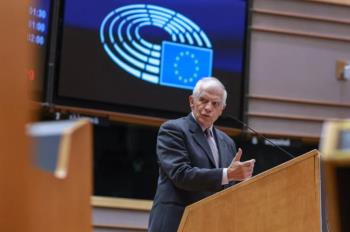Alwaght- Turkey has once again threatened Cyprus’ efforts to search gas off the Cyprus coasts and the eastern Mediterranean around the ethnically divided island.
Turkey’s prime minister Binali Yildirim said on Wednesday at a joint news conference with Tufan Erhurman, the prime minister of the self-declared Turkish Cypriot state, that “provocative activities will be met with the appropriate response.”
Yildirim's warning echoed remarkd by Yigit Bulut, senior advisor to President Recep Tayyip Erdogan of Turkey, who warned on Sunday the foreign companies over efforts to search for offshore gas, saying they could face strikes by Turkey’s armed forces.
Ankara opposes what it says are Greek Cypriots’ unilateral efforts to search for gas, saying they infringe on the rights of breakaway Turkish Cypriots to the island’s resources.
Yildirim’s comments came after reports that an ExxonMobil vessel was heading toward the Mediterranean, coinciding with exercises in the area involving the US Navy.
ExxonMobil and French company Total are among several firms that Cyprus has licensed to search for gas off its southern coast.
Turkey and Greece have serious historical disputes, but the recent rift over the gas and oil exploration in the Mediterranean is almost unprecedented.
Lasting Tensions
Over the course of past few years, Turkey-Greece relations have been tense over a set of issues, mainly related to territory. Ankara and Athens rows date back to the Ottoman Empire’s rule over Greece. The two sides’ leaders have occasionally made some efforts to de-escalate the tensions and improve ties, but have been unsuccessful.
Ankara and Athens’ rows were ostensibly defused when according to the Treaty of Lausanne in 1921 Ottoman forces withdrew from Greece with the mediation of the European parties. However, their rifts continued to unfold at various levels since then but never culminated in a direct armed clash as Europe and the US mediated to steer clear of seeing them coming to blows.
Another trouble-making issue between the two countries has been disagreement over Cyprus. Turkey attacked northern Cyprus in 1974, bringing under its control the Turkish-majority part of the Island state. Despite the fact that the south of the country is the center of the Republic of Cyprus, Turkey insists that the north is an independent republic and recognizes its rule. For decades, dispute over the Greek and Turkish parts of Cyprus has presented a hurdle ahead of friendly Ankara relations with Greece and even with Europe as a whole.
In 1996, tensions went to the brink of a full-scale war over Imia, a pair of small uninhabited islands in East Aegean Sea, but Europe mediated to prevent culmination of the rift into an armed conflict.
The territorial disputes between the two neighbors have continued for decades, and even Turkish President's historic trip to Greece in December last year after 65 years has failed to ease tensions. During the visit, the Erdogan commented on the Turkish minority rights, Cyprus, and the need to draw clear air and sea border lines in the Aegean Sea. The remarks, according to the Greek government’s spokesman, were worrisome and could renew the frontier rifts between the two states.
Oil and gas drilling ignite a new row
Recently, and while territorial tensions remain unresolved, energy dispute has been added to a collection of sticking points between Ankara and Athens. Turkish leaders lost their temper when the Greek part of Cyprus called on the foreign energy companies to prospect for oil and gas within its borders in the Aegean.
Immediately after the call, Turkey warned that the southern Cyprus was not allowed to use energy resources before an ultimate solution to the conflict with the north.
Greece has repeatedly expressed interest in accomplishing exploration operations off its coasts and discussed the case with a set of foreign energy firms, only to face the toughest warning of military action from Turkey.
The threat by Ankara faced reaction of the European Union. leaders of the 27-nation bloc blasted the Turkish actions in the Cyprus coasts and on the Greek sea borders, asking Ankara’s leaders to put an end to driving things towards escalation. Donald Tusk, president of the European Council was one of the critics of Turkey. He said that Ankara’s moves were provocative and violating the international laws and warned that such behavior could negatively affect bilateral relations, emphasizing that the EU was beside Greece and Cyprus.
“Turkey should avoid threats or actions against any EU member and instead commit to good neighborly relations, peaceful dispute settlement and respect for territorial sovereignty,” Tusk was quoted as saying on February 13 after speaking to Cyprus President Nicolas Anastasiades.
Eni exploration firm of Italy has recently said that its drilling ship was cordoned off by the Turkish warships and it was left with no choice but removing it from the area and head with it to Morocco coasts.
How serious are the Turkish-Greek military tensions?
Despite Turkey's warnings, the analysts note that anti-Greece and Cyprus military moves are hardly likely.
This is not the first time the two reach the stage of trading military threats. In 1996, too, things between them went to the level of a direct confrontation, but Washington and the EU mediated and kept them away from war.
This time, too, the EU appears to be putting to work utmost efforts to prevent a renewed escalation between Athens and Ankara, which are both members of the North Atlantic Treaty Organization (NATO). In a period of need for cohesion in a raging global race against other powers for influence, the West is growing serious concerns about NATO members’ military encounter, something it cannot afford to allow to happen.
Additionally, Turkey is now busy with a military campaign in northern Syria against the Kurds in the enclave of Afrin and its military is far from having the capacity to wage a new war. So, the Turkish military limitations leave no reason to expect any Turkey-Greece conflict in the present condition.



























